 Goal 1, No poverty: It is well documented that countries investing in science experience economic growth. Brazil, India and China—the so-called BRIC countries—more than doubled their spending on science research between 2002 to 2007 and are expected to have the world’s largest economies by 2050. These countries also represent the top three countries in terms of numbers of participating scientists that have benefitted from ICTP’s education and research activities. Goal 1, No poverty: It is well documented that countries investing in science experience economic growth. Brazil, India and China—the so-called BRIC countries—more than doubled their spending on science research between 2002 to 2007 and are expected to have the world’s largest economies by 2050. These countries also represent the top three countries in terms of numbers of participating scientists that have benefitted from ICTP’s education and research activities. |
|
| |
|
|
 Goal 2, Zero hunger: ICTP’s Wireless Technologies Laboratory has organized a number of workshops throughout the developing world on applications for the Internet of Things, including how networks of sensors could help farmers decide when to use precious water resources to water their crops, helping to promote sustainable agriculture. Goal 2, Zero hunger: ICTP’s Wireless Technologies Laboratory has organized a number of workshops throughout the developing world on applications for the Internet of Things, including how networks of sensors could help farmers decide when to use precious water resources to water their crops, helping to promote sustainable agriculture.
|
|
| |
|
|
 Goal 3, Good health and well-being: ICTP’s Earth System Physics (ESP) group helped develop a computer model of climate and disease interactions that provides reliable forecasts of malaria outbreaks in Africa. The forecasts allow health workers and planners to react in a timely manner to reduce the severity of the outbreaks. Goal 3, Good health and well-being: ICTP’s Earth System Physics (ESP) group helped develop a computer model of climate and disease interactions that provides reliable forecasts of malaria outbreaks in Africa. The forecasts allow health workers and planners to react in a timely manner to reduce the severity of the outbreaks.
|
|
| |
|
|
 Goal 4, Quality education: For more than 50 years, ICTP has educated thousands of developing country scientists in physics and mathematics, providing valuable, unique opportunities to the underprivileged. It promotes life-long learning through its Associates programme, which supports brief visits of developing-world scientists to ICTP to help them refresh their knowledge and network with top physicists and mathematicians. See also ICTP’s outreach programme to university students, Physics Without Frontiers. Goal 4, Quality education: For more than 50 years, ICTP has educated thousands of developing country scientists in physics and mathematics, providing valuable, unique opportunities to the underprivileged. It promotes life-long learning through its Associates programme, which supports brief visits of developing-world scientists to ICTP to help them refresh their knowledge and network with top physicists and mathematicians. See also ICTP’s outreach programme to university students, Physics Without Frontiers.
|
|
| |
|
|
 Goal 5, Gender equality: Women are a clear minority in the field of physics. ICTP hopes to address this inequality through a number of initiatives aimed at increasing the participation and representation of women in physics at the Centre. These include hosting a Career Development Workshop for Women in Physics, and the appointment of a coordinator for ICTP's women in physics initiatives. Goal 5, Gender equality: Women are a clear minority in the field of physics. ICTP hopes to address this inequality through a number of initiatives aimed at increasing the participation and representation of women in physics at the Centre. These include hosting a Career Development Workshop for Women in Physics, and the appointment of a coordinator for ICTP's women in physics initiatives.
|
|
| |
|
|
 Goal 6, Clean water and sanitation: How will climate change affect water resources for human development? This is a question that ICTP's Earth System Physics section investigates. By using sophisticated impact models, including socioeconomic information, they can calculate the hydrological effects of long-term climate change. A recent study showed that the increase of the occurrence and intensity of extreme events due to global warming poses a substantial threat to the sustainable development of Africa, North America, Europe and Australia. Goal 6, Clean water and sanitation: How will climate change affect water resources for human development? This is a question that ICTP's Earth System Physics section investigates. By using sophisticated impact models, including socioeconomic information, they can calculate the hydrological effects of long-term climate change. A recent study showed that the increase of the occurrence and intensity of extreme events due to global warming poses a substantial threat to the sustainable development of Africa, North America, Europe and Australia.
|
|
| |
|
|
 Goal 7, Affordable and clean energy: ICTP has established a sustainable energy research group to address the scientific challenge of providing cheap and clean energy to the world. The group is hunting for alternative ways to harvest the Sun's energy, testing new methods by modelling molecular interactions of functional materials using supercomputers. The goal is to find a way to make solar cells economically viable for developing countries. Goal 7, Affordable and clean energy: ICTP has established a sustainable energy research group to address the scientific challenge of providing cheap and clean energy to the world. The group is hunting for alternative ways to harvest the Sun's energy, testing new methods by modelling molecular interactions of functional materials using supercomputers. The goal is to find a way to make solar cells economically viable for developing countries.
|
|
| |
|
|
 Goal 8, Decent work and economic growth: ICTP supports this goal by providing the education and training that physicists and mathematicians from around the world need to establish and maintain productive careers and promote sustainable science in their home countries. As already stated in Goal 1, science has important, positive benefits to world economies. Goal 8, Decent work and economic growth: ICTP supports this goal by providing the education and training that physicists and mathematicians from around the world need to establish and maintain productive careers and promote sustainable science in their home countries. As already stated in Goal 1, science has important, positive benefits to world economies.
|
|
| |
|
|
 Goal 9, Industry, innovation and infrastructure: When it comes to fostering innovation for the developing world, ICTP has an exemplary track record. As already mentioned in Goal 2, its Wireless Technologies Laboratory spreads knowledge about low-cost sensors that have applications ranging from monitoring air quality to detecting the next malaria outbreak. ICTP’s SciFabLab investigates and promotes low-cost technologies that can be used in science education, such as 3D printers. Goal 9, Industry, innovation and infrastructure: When it comes to fostering innovation for the developing world, ICTP has an exemplary track record. As already mentioned in Goal 2, its Wireless Technologies Laboratory spreads knowledge about low-cost sensors that have applications ranging from monitoring air quality to detecting the next malaria outbreak. ICTP’s SciFabLab investigates and promotes low-cost technologies that can be used in science education, such as 3D printers.
|
|
| |
|
|
 Goal 10, Reduced inequalities: Inequalities in the modern world stem more and more from inequalities in education and access to technology (e.g., the digital divide). Since its inception, ICTP’s mission has been to foster sustainable science throughout the developing world. In this way, the Centre has helped to reduce the great educational and scientific divide between developed and developing countries. Goal 10, Reduced inequalities: Inequalities in the modern world stem more and more from inequalities in education and access to technology (e.g., the digital divide). Since its inception, ICTP’s mission has been to foster sustainable science throughout the developing world. In this way, the Centre has helped to reduce the great educational and scientific divide between developed and developing countries.
|
|
| |
|
|
 Goal 11, Sustainable cities and communities: ICTP’s Wireless Technologies Laboratory and its promotion of Internet of Things technologies, such as connected sensors, plays an important role in helping cities to maintain air quality. Disaster risk reduction is also key for sustainable cities, and ICTP’s research on earthquake hazards and seismic risk mitigation supports this goal. Goal 11, Sustainable cities and communities: ICTP’s Wireless Technologies Laboratory and its promotion of Internet of Things technologies, such as connected sensors, plays an important role in helping cities to maintain air quality. Disaster risk reduction is also key for sustainable cities, and ICTP’s research on earthquake hazards and seismic risk mitigation supports this goal.
|
|
| |
|
|
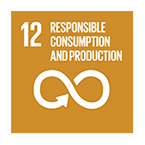 Goal 12, Responsible consumption and production: The UN includes in this goal the environmentally sound management of hazardous waste. ICTP and its UN sponsor the International Atomic Energy Agency address this goal by holding annual workshops on nuclear waste management. Goal 12, Responsible consumption and production: The UN includes in this goal the environmentally sound management of hazardous waste. ICTP and its UN sponsor the International Atomic Energy Agency address this goal by holding annual workshops on nuclear waste management.
|
|
| |
|
|
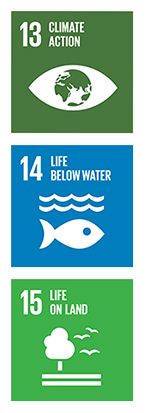 Goals 13 (Climate action), 14 (Life below water) and 15 (Life on land): ICTP’s ESP group has a strong record of achievement related to all three of these goals. The group’s lead scientist, Filippo Giorgi, played a major role in the Nobel Peace Prize-winning International Panel on Climate Change, with his group’s world-renowned regional climate change model, RegCM, providing key input into international climate initiatives (Goal 13). ESP also researches the ocean, in particular the role it plays in the mechanisms behind natural variability and predictability of the climate system at various time scales (Goal 14). Finally, its anthropogenic climate change research line investigates the global and regional climate response to increased atmospheric greenhouse gas concentrations and the effects of land use modifications (Goal 15). Goals 13 (Climate action), 14 (Life below water) and 15 (Life on land): ICTP’s ESP group has a strong record of achievement related to all three of these goals. The group’s lead scientist, Filippo Giorgi, played a major role in the Nobel Peace Prize-winning International Panel on Climate Change, with his group’s world-renowned regional climate change model, RegCM, providing key input into international climate initiatives (Goal 13). ESP also researches the ocean, in particular the role it plays in the mechanisms behind natural variability and predictability of the climate system at various time scales (Goal 14). Finally, its anthropogenic climate change research line investigates the global and regional climate response to increased atmospheric greenhouse gas concentrations and the effects of land use modifications (Goal 15).
|
|
| |
|
|
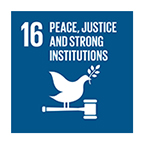 Goal 16, Peace, justice and strong institutions: ICTP is committed to spreading its brand of scientific support throughout the world. To that end, it is setting up regional centres of excellence. The idea is to bring ICTP's unique blend of high-quality physics and mathematics education and high-level science meetings closer to scientists everywhere. ICTP partner institutes now exist in Brazil, Mexico, Rwanda and China. In addition, the services provided by ICTP's Marie Curie Library, including its electronic Journals Delivery Service (eJDS), meets Goal 16's target to ensure public access to information. Goal 16, Peace, justice and strong institutions: ICTP is committed to spreading its brand of scientific support throughout the world. To that end, it is setting up regional centres of excellence. The idea is to bring ICTP's unique blend of high-quality physics and mathematics education and high-level science meetings closer to scientists everywhere. ICTP partner institutes now exist in Brazil, Mexico, Rwanda and China. In addition, the services provided by ICTP's Marie Curie Library, including its electronic Journals Delivery Service (eJDS), meets Goal 16's target to ensure public access to information.
|
|
| |
|
|
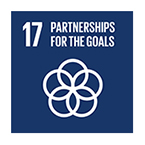 Goal 17, Partnerships for the goals: ICTP’s success in addressing the Sustainable Development Goals would not be possible without the many partnerships it enjoys with numerous governmental, non-governmental, educational and scientific institutes and organizations. Key among those are the three entities that provide ICTP’s main support: the Italian government, UNESCO and the IAEA. Thanks to these crucial partnerships, ICTP can make important contributions to the betterment of humanity, ensuring a sustainable future for all. Goal 17, Partnerships for the goals: ICTP’s success in addressing the Sustainable Development Goals would not be possible without the many partnerships it enjoys with numerous governmental, non-governmental, educational and scientific institutes and organizations. Key among those are the three entities that provide ICTP’s main support: the Italian government, UNESCO and the IAEA. Thanks to these crucial partnerships, ICTP can make important contributions to the betterment of humanity, ensuring a sustainable future for all.
|
|
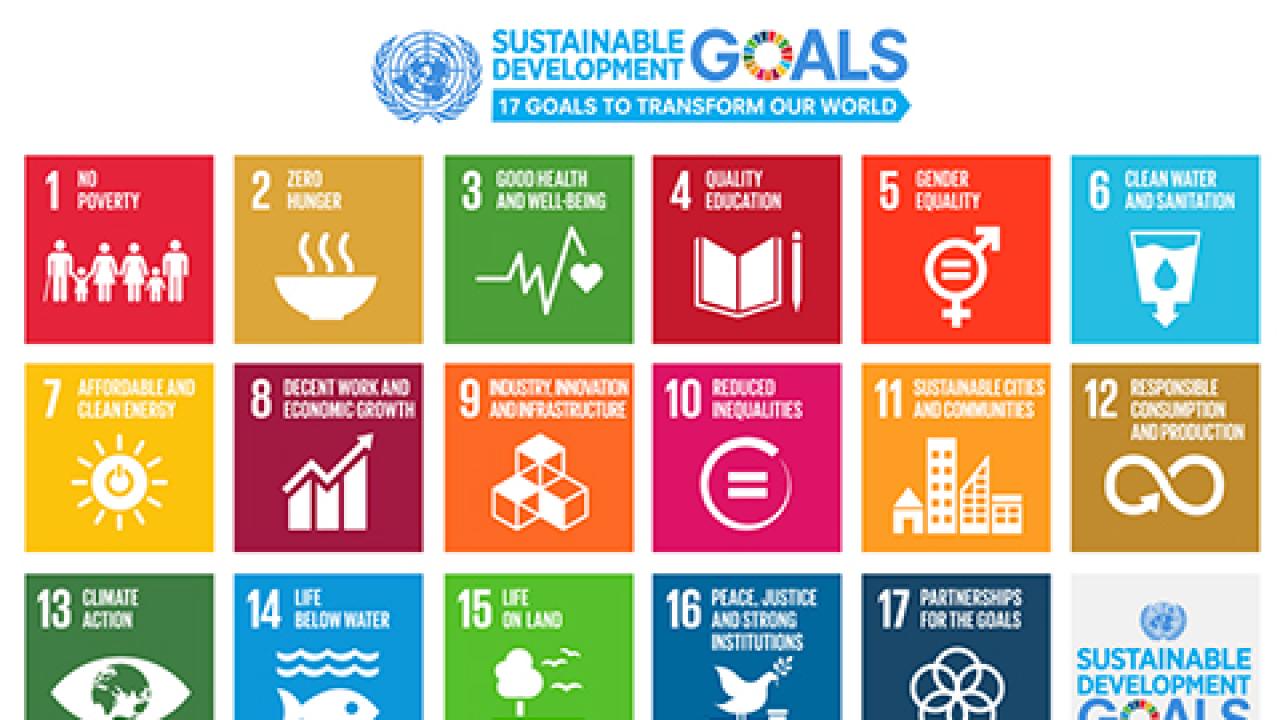
 Goal 1, No poverty: It is well documented that countries investing in science experience economic growth. Brazil, India and China—the so-called BRIC countries—more than doubled their spending on science research between 2002 to 2007 and are expected to have the world’s largest economies by 2050. These countries also represent the top three countries in terms of numbers of participating scientists that have benefitted from ICTP’s education and research activities.
Goal 1, No poverty: It is well documented that countries investing in science experience economic growth. Brazil, India and China—the so-called BRIC countries—more than doubled their spending on science research between 2002 to 2007 and are expected to have the world’s largest economies by 2050. These countries also represent the top three countries in terms of numbers of participating scientists that have benefitted from ICTP’s education and research activities.
















 Goal 2, Zero hunger: ICTP’s
Goal 2, Zero hunger: ICTP’s  Goal 3, Good health and well-being: ICTP’s
Goal 3, Good health and well-being: ICTP’s  Goal 4, Quality education: For more than 50 years, ICTP has educated thousands of developing country scientists in physics and mathematics, providing valuable, unique opportunities to the underprivileged. It promotes life-long learning through its
Goal 4, Quality education: For more than 50 years, ICTP has educated thousands of developing country scientists in physics and mathematics, providing valuable, unique opportunities to the underprivileged. It promotes life-long learning through its  Goal 5, Gender equality: Women are a clear minority in the field of physics. ICTP hopes to address this inequality through a number of initiatives aimed at increasing the participation and representation of women in physics at the Centre. These include hosting a
Goal 5, Gender equality: Women are a clear minority in the field of physics. ICTP hopes to address this inequality through a number of initiatives aimed at increasing the participation and representation of women in physics at the Centre. These include hosting a  Goal 6, Clean water and sanitation: How will climate change affect water resources for human development? This is a question that ICTP's
Goal 6, Clean water and sanitation: How will climate change affect water resources for human development? This is a question that ICTP's  Goal 7, Affordable and clean energy: ICTP has established a
Goal 7, Affordable and clean energy: ICTP has established a  Goal 8, Decent work and economic growth: ICTP supports this goal by providing the education and training that physicists and mathematicians from around the world need to establish and maintain productive careers and promote sustainable science in their home countries. As already stated in Goal 1, science has important, positive benefits to world economies.
Goal 8, Decent work and economic growth: ICTP supports this goal by providing the education and training that physicists and mathematicians from around the world need to establish and maintain productive careers and promote sustainable science in their home countries. As already stated in Goal 1, science has important, positive benefits to world economies. Goal 9, Industry, innovation and infrastructure: When it comes to fostering innovation for the developing world, ICTP has an exemplary track record. As already mentioned in Goal 2, its Wireless Technologies Laboratory spreads knowledge about low-cost sensors that have applications ranging from monitoring air quality to detecting the next malaria outbreak.
Goal 9, Industry, innovation and infrastructure: When it comes to fostering innovation for the developing world, ICTP has an exemplary track record. As already mentioned in Goal 2, its Wireless Technologies Laboratory spreads knowledge about low-cost sensors that have applications ranging from monitoring air quality to detecting the next malaria outbreak.  Goal 10, Reduced inequalities: Inequalities in the modern world stem more and more from inequalities in education and access to technology (e.g., the digital divide). Since its inception, ICTP’s mission has been to foster sustainable science throughout the developing world. In this way, the Centre has helped to reduce the great educational and scientific divide between developed and developing countries.
Goal 10, Reduced inequalities: Inequalities in the modern world stem more and more from inequalities in education and access to technology (e.g., the digital divide). Since its inception, ICTP’s mission has been to foster sustainable science throughout the developing world. In this way, the Centre has helped to reduce the great educational and scientific divide between developed and developing countries. Goal 11, Sustainable cities and communities: ICTP’s Wireless Technologies Laboratory and its promotion of Internet of Things technologies, such as connected sensors, plays an important role in helping cities to maintain air quality. Disaster risk reduction is also key for sustainable cities, and ICTP’s
Goal 11, Sustainable cities and communities: ICTP’s Wireless Technologies Laboratory and its promotion of Internet of Things technologies, such as connected sensors, plays an important role in helping cities to maintain air quality. Disaster risk reduction is also key for sustainable cities, and ICTP’s  Goal 12, Responsible consumption and production: The UN includes in this goal the environmentally sound management of hazardous waste. ICTP and its UN sponsor the
Goal 12, Responsible consumption and production: The UN includes in this goal the environmentally sound management of hazardous waste. ICTP and its UN sponsor the  Goals 13 (Climate action), 14 (Life below water) and 15 (Life on land): ICTP’s ESP group has a strong record of achievement related to all three of these goals. The group’s lead scientist, Filippo Giorgi, played a major role in the Nobel Peace Prize-winning International Panel on Climate Change, with his group’s world-renowned regional climate change model,
Goals 13 (Climate action), 14 (Life below water) and 15 (Life on land): ICTP’s ESP group has a strong record of achievement related to all three of these goals. The group’s lead scientist, Filippo Giorgi, played a major role in the Nobel Peace Prize-winning International Panel on Climate Change, with his group’s world-renowned regional climate change model,  Goal 16, Peace, justice and strong institutions: ICTP is committed to spreading its brand of scientific support throughout the world. To that end, it is setting up
Goal 16, Peace, justice and strong institutions: ICTP is committed to spreading its brand of scientific support throughout the world. To that end, it is setting up  Goal 17, Partnerships for the goals: ICTP’s success in addressing the Sustainable Development Goals would not be possible without the many partnerships it enjoys with numerous governmental, non-governmental, educational and scientific institutes and organizations. Key among those are the three entities that provide ICTP’s main support: the Italian government,
Goal 17, Partnerships for the goals: ICTP’s success in addressing the Sustainable Development Goals would not be possible without the many partnerships it enjoys with numerous governmental, non-governmental, educational and scientific institutes and organizations. Key among those are the three entities that provide ICTP’s main support: the Italian government,